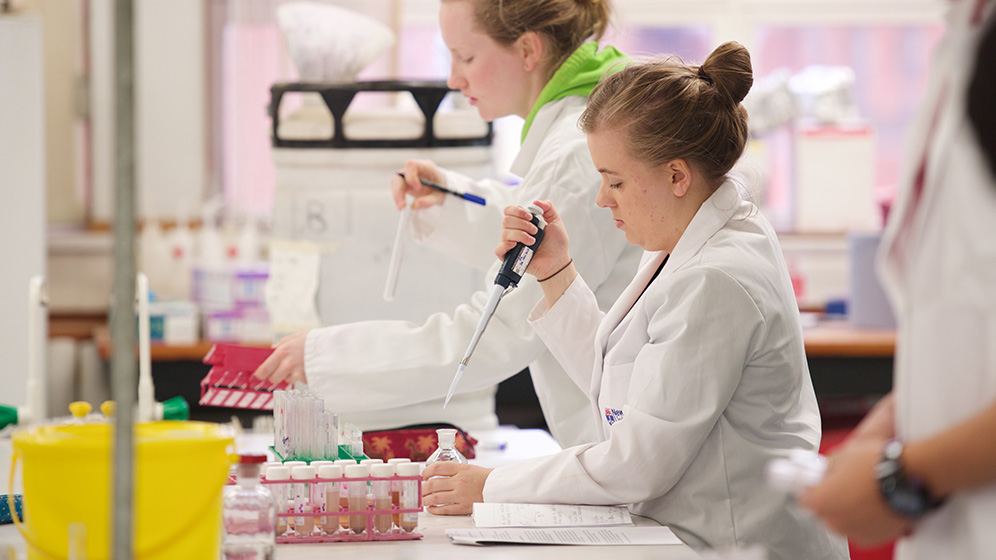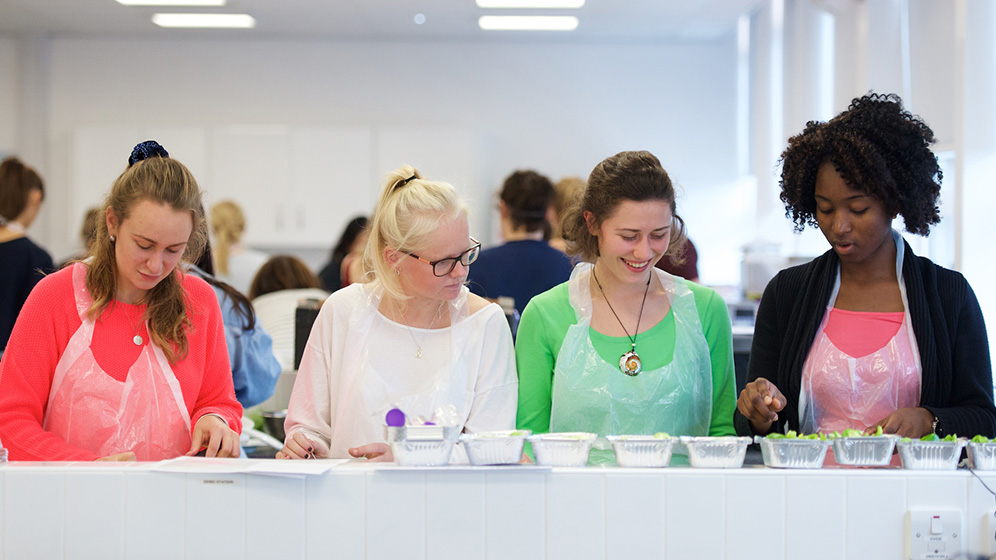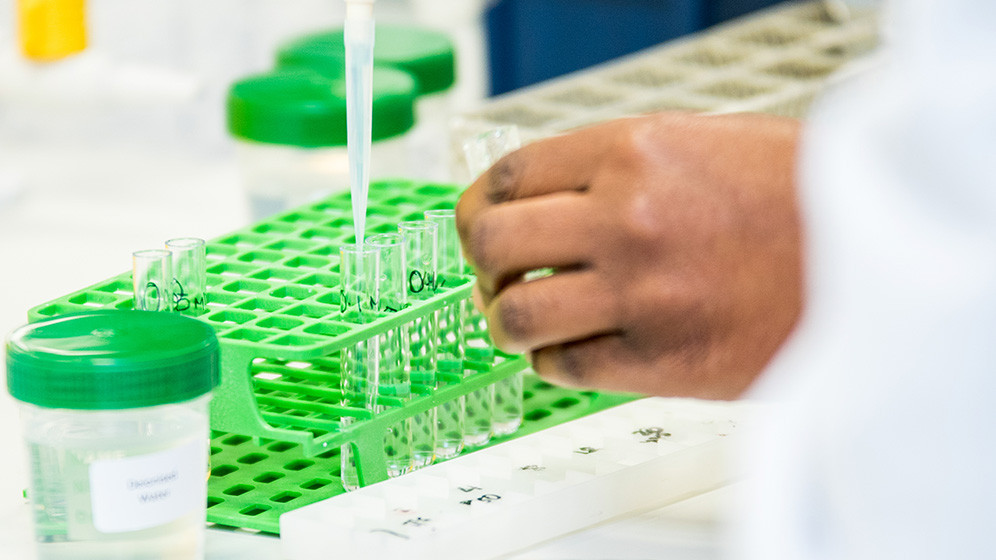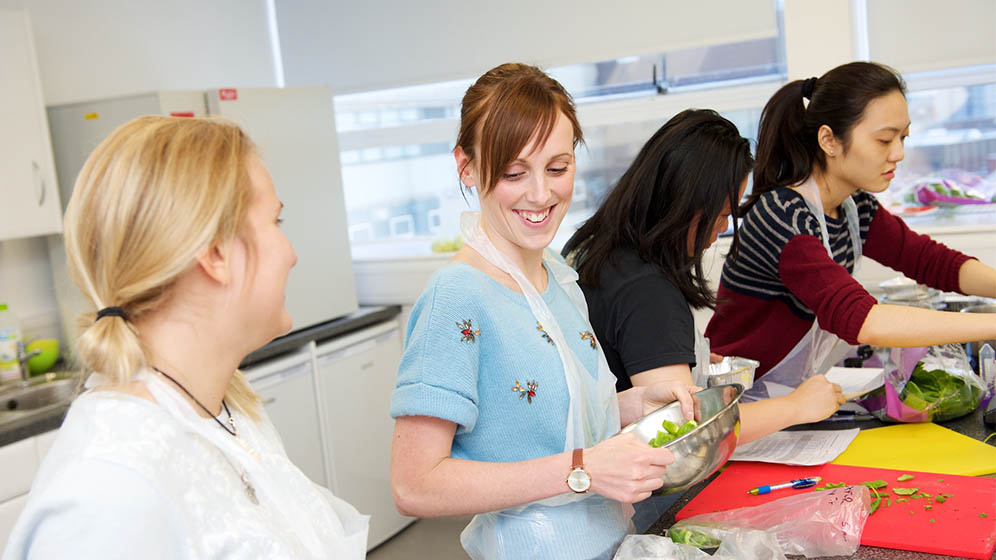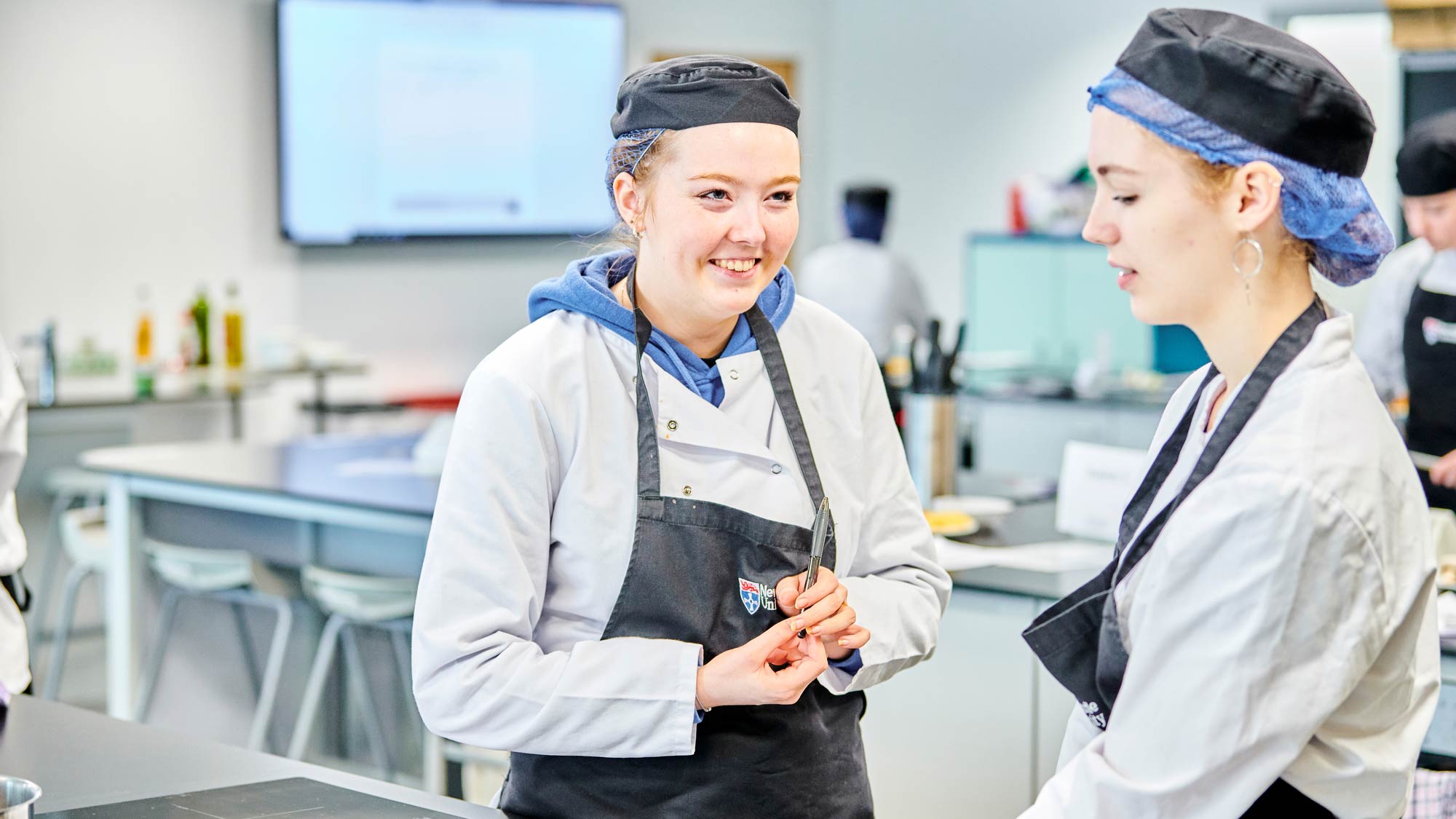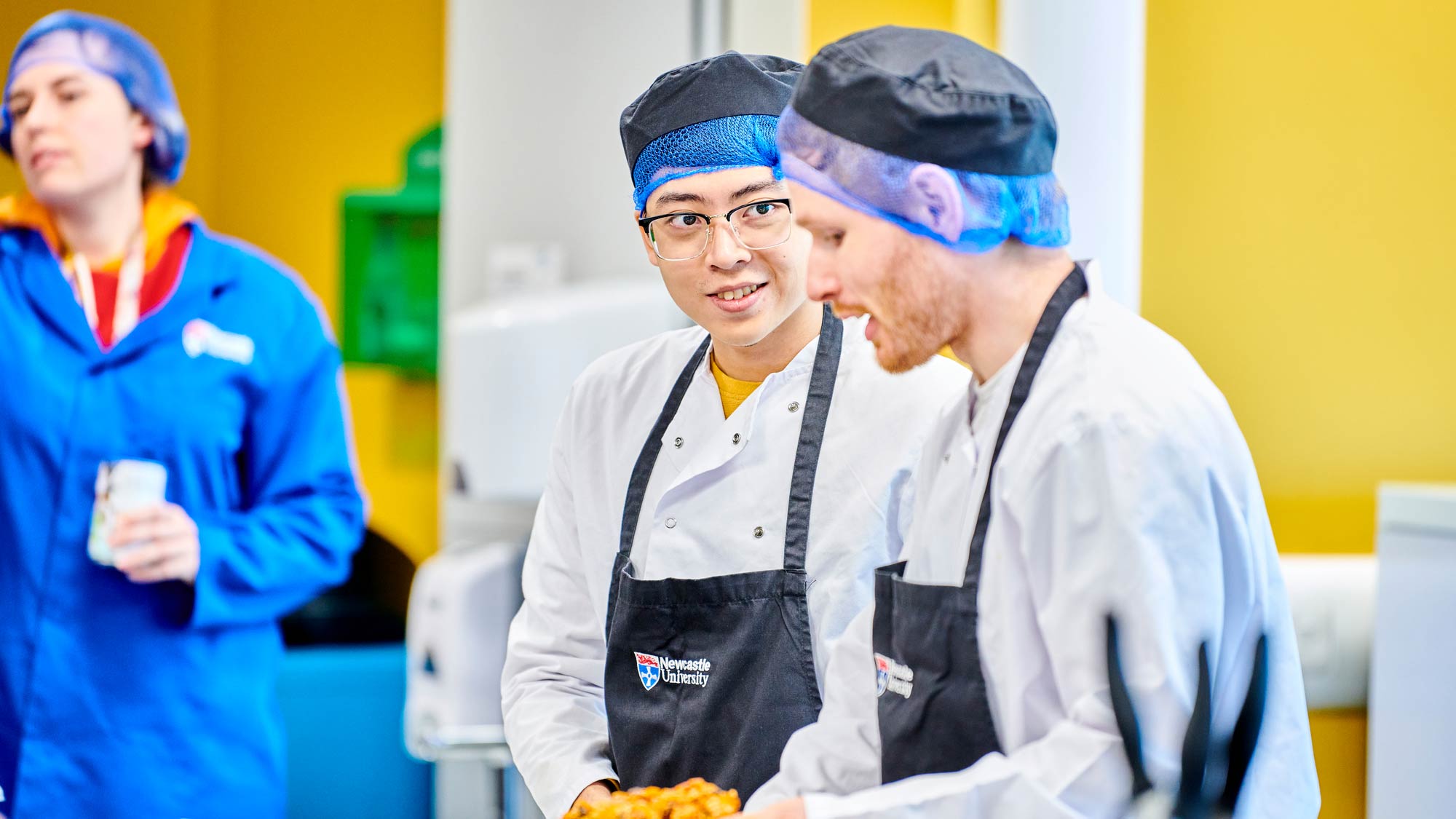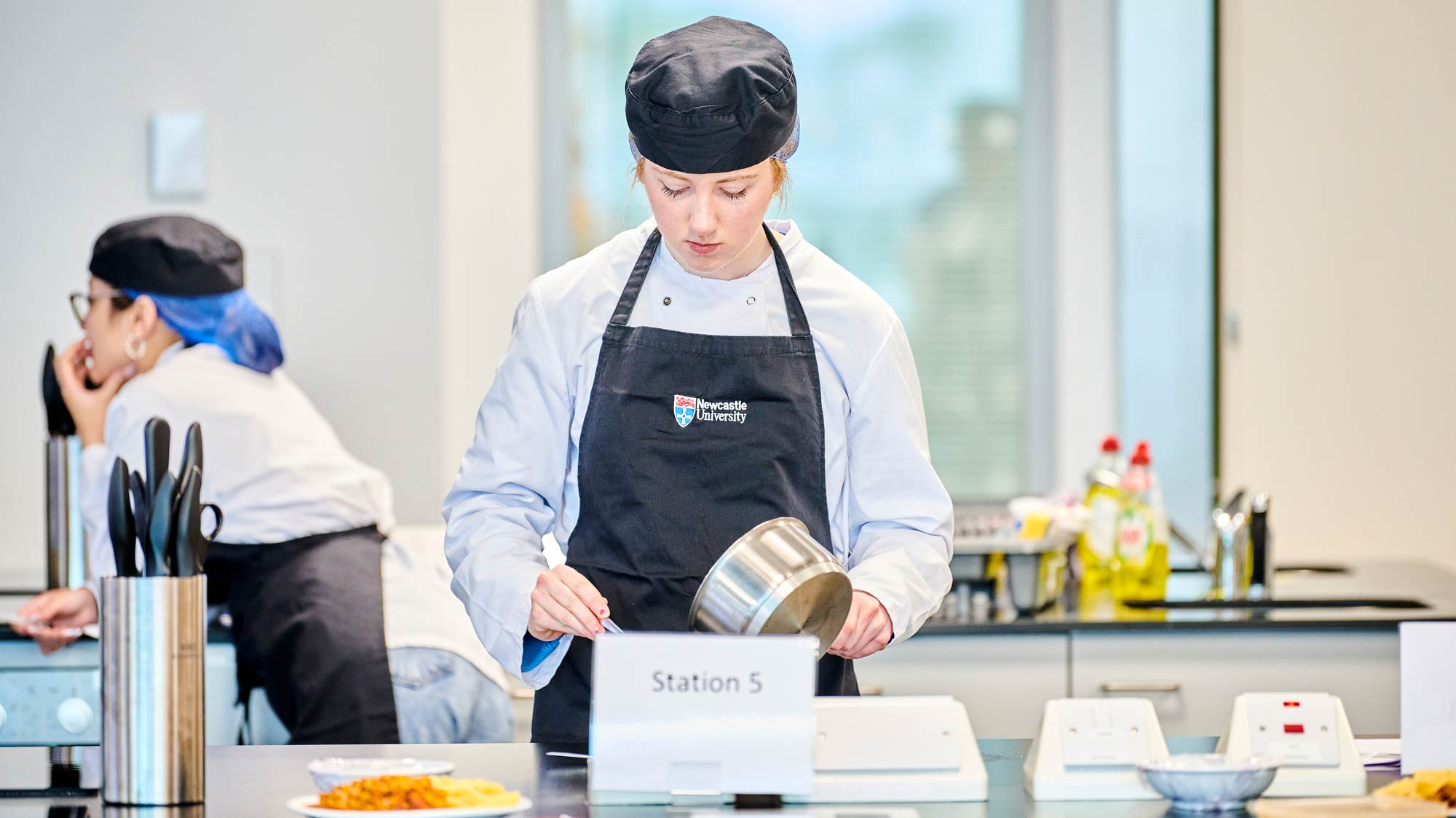Human Nutrition with Placement BSc Honours
- UCAS code: B4D6
- Full time
- 4 years
Our accredited human nutrition degree explores the links between diet and health and will equip you with practical skills and documented professional experience, so you're ready to make an impact through a career in nutrition.
You are currently viewing course information for entry year: 2026
Next start date:
- September 2026
UCAS Institution name and code:
- NEWC / N21
Course overview
This four-year human nutrition degree focuses on developing your practical, professional and research skills so you graduate career-ready.
Between your second and final year, you'll carry out a professional work placement. This is an opportunity to apply your knowledge in a food and nutrition work environment and gain vital professional experience to help you stand out from other graduates.
Our industry-recognised qualification helps to fast-track your career, so you can apply for direct entry into the UK Voluntary Register of Nutritionists as soon as you graduate.
Our degree is informed by research, this ensures you're learning the most up-to-date and relevant theories along with the latest discoveries in the industry.
Through studying one of our Nutrition and Dietetics courses you'll look at nutrition from the cellular and molecular level through to people and populations. You'll also have the opportunity to explore topics such as genetics, physiology, bioenergetics and sport and exercise nutrition, among others.
READ MORE

Your course and study experience - disclaimers and terms and conditions
Please rest assured we make all reasonable efforts to provide you with the programmes, services and facilities described. However, it may be necessary to make changes due to significant disruption, for example in response to Covid-19.
View our Academic experience page, which gives information about your Newcastle University study experience for the academic year 2025-26.
See our terms and conditions and student complaints information, which gives details of circumstances that may lead to changes to programmes, modules or University services.
Quality and ranking
Professional accreditation and recognition
All professional accreditations are reviewed regularly by their professional body.
Modules and learning
Modules
The information below is intended to provide an example of what you will study.
Most degrees are divided into stages. Each stage lasts for one academic year, and you'll complete modules totalling 120 credits by the end of each stage.
Our teaching is informed by research. Course content may change periodically to reflect developments in the discipline, the requirements of external bodies and partners, and student feedback.
Optional module availability
Student demand for optional modules may affect availability.
Full details of the modules on offer will be published through the Programme Regulations and Specifications ahead of each academic year. This usually happens in May.
To find out more please see our terms and conditions
You're introduced to the underlying sciences of food human nutrition. You study modules in nutrition, genetics, biochemistry, microbiology, immunology and physiology.
You'll be introduced to topics such as:
- food sustainability
- food security
- ethical considerations in the food industry
We'll also support you in your career and personal planning to begin your professional development.
Modules
You continue to develop your core knowledge of human nutrition and associated topics. You'll explore nutritional assessment and the importance of good nutrition at each life stage. You'll also investigate food science and food product development, and study the latest research developments in sports and exercise nutrition.
In the Health Psychology and Behaviour module, you are introduced to ways communication may be used to support positive changes in human health and wellbeing.
Modules
You spend this year on a work placement in the UK or abroad.
Modules
| Compulsory Modules | Credits |
|---|---|
| Nutrition Professional Placement Year | 120 |
In the final year, you will study areas such as nutrition and its relation to health and disease, metabolic and personalised nutrition and the scientific basis for setting nutrient requirements in people.
You'll continue to develop and apply your nutrition knowledge and practical skills. You'll plan, organise, and conduct a research project, under academic supervision.
Modules
| Compulsory Modules | Credits |
|---|---|
| Research Project | 40 |
| Contemporary Issues in Food and Human Nutrition | 20 |
| Personalised Nutrition | 10 |
| Nutritional Epidemiology and Public Health | 30 |
| Optional Modules | Credits |
|---|---|
| Nutrition Enterprise and Career Skills | 20 |
| Allergens and the Food Industry | 20 |
| Making Sense of Forgotten Senses: Investigating Olfaction and Gustation | 20 |
We base these figures and graphs on the most up-to-date information available to us. They are based on the modules chosen by our students in 2024-25.
Teaching time is made up of:
- scheduled learning and teaching activities. These are timetabled activities with a member of staff present.
- structured guided learning. These are activities developed by staff to support engagement with module learning. Students or groups of students undertake these activities without direct staff participation or supervision
Teaching and assessment
Teaching methods
Contact hours are made up of a combination of:
- lectures
- seminars
- small group tutorials
- practical classes
- online sessions
You supplement this with weekly private study of recommended reading materials.
Assessment methods
You'll be assessed through a combination of:
-
Case studies
-
Dissertation or research project
-
Essays
-
Examinations – practical or online
-
Presentations
-
Projects
Skills and experience
Research skills
In the final year of your degree, you'll complete a research project. The aim of the project is to provide you with experience of planning, researching and analysing a topic that interests you.
You will develop your research skills, as well as improving your problem-solving, analytical and presentation skills.
Opportunities
Study abroad
Experience life in another country by choosing to study abroad as part of your degree. You’ll be encouraged to embrace fun and challenging experiences, make connections with new communities and graduate as a globally aware professional, ready for your future.
You can choose to spend up to a year studying at a partner institution overseas.
If you choose to study abroad, it will extend your degree by a year.
Find out more about study abroad
Work placement
Get career ready with a work placement and leave as a confident professional in your field. You can apply to spend 9 to 12 months working in any organisation in the world, and receive University support from our dedicated team to secure your dream placement. Work placements take place between stages 2 and 3.
You'll gain first-hand experience of working in the sector, putting your learning into practice and developing your professional expertise.
If you choose to take a work placement, it will extend your degree by a year. Work placement is not available if you're spending a year abroad. Placements are subject to availability.
Find out more about work placements
Additional qualification
You also have the opportunity during your placement to gain a Licentiateship of the City and Guilds Institute, London (equivalent to NVQ Level 4), award. You'll collate evidence of your work experience and skills development as a portfolio.
We are currently the only nutrition course in the UK to offer this opportunity to gain an additional qualification in recognition of your development of personal, and transferable skills in the workplace.
Facilities and environment
Facilities
You'll be based at our Newcastle city-centre campus, in the School of Biomedical, Nutritional and Sports Sciences. The School is in the Faculty of Medical Sciences, which is also home to Dentistry, Medicine, Psychology and Pharmacy, encouraging inter-professional collaboration.
We've invested £32 million in new facilities for nutrition teaching and research, which opened in 2020. You'll have access to our nutrition training suite, including a food handling laboratory, consultation rooms and sensory analysis booths to help you enhance your practical skills. You’ll also have use of well-equipped, biomedical science laboratories.
Situated next to Newcastle’s RVI hospital, we’re one of the largest integrated teaching/hospital complexes in the country.
Research Excellence in Nutrition and Exercise
To enhance your learning experience, you will be part of a thriving research community at the Human Nutrition and Exercise Research Centre. Our team of experts is dedicated to advancing the understanding of nutrition, exercise, and their combined impact on health, wellbeing and disease. You will have the opportunity to engage with, and participate in, cutting-edge research and gain insights that will enrich your academic journey.
Sorry, you need JavaScript to view this video
Support
We provide plenty of support to help you successfully move from school to university study. We’ll help you settle in quickly and are here if you have any issues.
You'll have the support of an academic member of staff as a personal tutor throughout your degree to help with academic and personal issues.
Peer mentors will help you in your first year. They are fellow students who can help you settle in and answer any questions you have when starting university.
Your future
Learn about the careers our graduates have pursued on the School of Biomedical, Nutritional and Sport Sciences website.
There is great demand for scientists with a knowledge of nutrition. A wide range of opportunities exist across the sector, including:
- product development or quality assurance in the food industry
- with non-commercial bodies such as the Medical Research Council or Department for Environment, Food and Rural Affairs
- in research development
- in an advisory capacity with groups concerned with the communication of health messages and food safety advice
Graduates have gone on to take up roles, such as:
- dietetic assistant
- nutritionist
- food technologist
- food buyer
- product development technologist
- sports nutritionist
Make a difference
Sorry, you need JavaScript to view this video
Careers support
Our Careers Service is one of the largest and best in the country, and we have strong links with employers. We provide an extensive range of opportunities to all students through our ncl+ initiative.
Visit our Careers Service website
Recognition of professional qualifications outside of the UK
If you’re studying an accredited degree and thinking about working in Europe after you graduate, the best place to find current information is the UK Government’s guidance on recognition of UK professional qualifications in EU member states. This official resource explains whether your profession is regulated in another country, what steps you need to take, and which organisation you should contact.
Entry requirements
All candidates are considered on an individual basis and we accept a broad range of qualifications.
The entrance requirements and offers below apply to 2026 entry.
| A-Level | |
|---|---|
| International Baccalaureate | |
|---|---|
Other UK and the Republic of Ireland qualifications
Alternative offers at Newcastle
Through one of our contextual or alternative offer routes, you could receive an offer of up to three grades lower than the typical requirements.
Contextual offers
We use certain contextual data from your UCAS form, alongside your application, to consider challenges that you may have faced in your education and the potential effect this may have had on your qualifications. This means you may be eligible to receive a lower contextual offer.
PARTNERS offers
One of the largest and longest support entry routes to university of its kind for students from underrepresented backgrounds. We support applicants from application through to study.
Realising Opportunities offers
A unique programme delivered in collaboration with 10 leading, research-intensive universities in the UK. The programme is open to students in Year 12/first year of college.
Pathways to Newcastle offers
Pathways to Newcastle, our national skills entry route, is available for specific subject areas.
High Performance Athletes
We support promising athletes at the application stage, who compete in regional, national or international levels in their sport.
Qualifications from outside the UK
English Language requirements
Entrance courses (INTO)
International Pathway courses are specialist programmes designed for international students who want to study in the UK. We provide a range of study options for international students in partnership with INTO.
These courses are specifically designed for international students who want to study in the UK and progress onto one of our undergraduate degrees. Our International Study Centre, has a range of study options including:
- International Foundation
- International Year One
- English Language courses
Find out more about International Pathway courses
Admissions policy
This policy applies to all undergraduate and postgraduate admissions at Newcastle University. It is intended to provide information about our admissions policies and procedures to applicants and potential applicants, to their advisors and family members, and to staff of the University.
University Admissions Policy and related policies and procedures
Credit transfer and Recognition of Prior Learning
Recognition of Prior Learning (RPL) can allow you to convert existing relevant university-level knowledge, skills and experience into credits towards a qualification. Find out more about the RPL policy which may apply to this course.
Tuition fees and scholarships
Tuition fees for academic year 2026-2027
The 2026 entry home fees have not yet been confirmed.
| Qualification: BSc Honours | |
|---|---|
|
Home students full time 4 years |
Tuition fees (Year 1)
Not set |
|
International students full time 4 years |
Tuition fees (Year 1)
30,900 |
Year abroad and additional costs
For programmes where you can spend a year on a work placement or studying abroad, you will receive a significant fee reduction for that year.
Some of our degrees involve additional costs which are not covered by your tuition fees.
Scholarships
Find out more about:
Open days and events
You'll have a number of opportunities to meet us throughout the year at our on-campus and virtual open days.
You'll be able to:
- explore our beautiful campus
- find out about our vibrant city
- discover what students think about studying at Newcastle
You'll also have the opportunity to speak to academic staff and find out more about the subjects you're interested in.
Find out about how you can visit Newcastle in person and virtually.
We regularly travel overseas to meet with students interested in studying at Newcastle University. Visit our events calendar to find out when we're visiting your region.
How to apply
Apply through UCAS
To apply for undergraduate study at Newcastle University, you must use the online application system managed by the Universities and Colleges Admissions Service (UCAS). All UK schools and colleges, and a small number of EU and international establishments, are registered with UCAS. You will need:
- the UCAS name and institution codes for Newcastle University (NEWC/N21)
- the UCAS code for the course you want to apply for
- the UCAS 'buzzword' for your school or college
If you are applying independently, or are applying from a school or college which is not registered to manage applications, you will still use the Apply system. You will not need a buzzword.
Apply through UCASApply through an agent
International students often apply to us through an agent. Have a look at our recommended agents and get in touch with them.
Get in touch
By phone
Call us on +44 (0) 191 208 3333 and press option 1. Our opening hours are Monday to Friday 10am until 4pm.
Live chat
Our NCL chatbot might be able to give you an answer straight away. If not, it’ll direct you to someone who can help.
You'll find our NCL chatbot in the bottom right of this page.
Online
Chat to our students
Choosing a university is a big decision. If you've got questions about a particular course, student life or the city of Newcastle, why not chat to our friendly students or graduates!
Keep updated
We regularly send email updates and extra information about the University.
Receive regular updates by email




